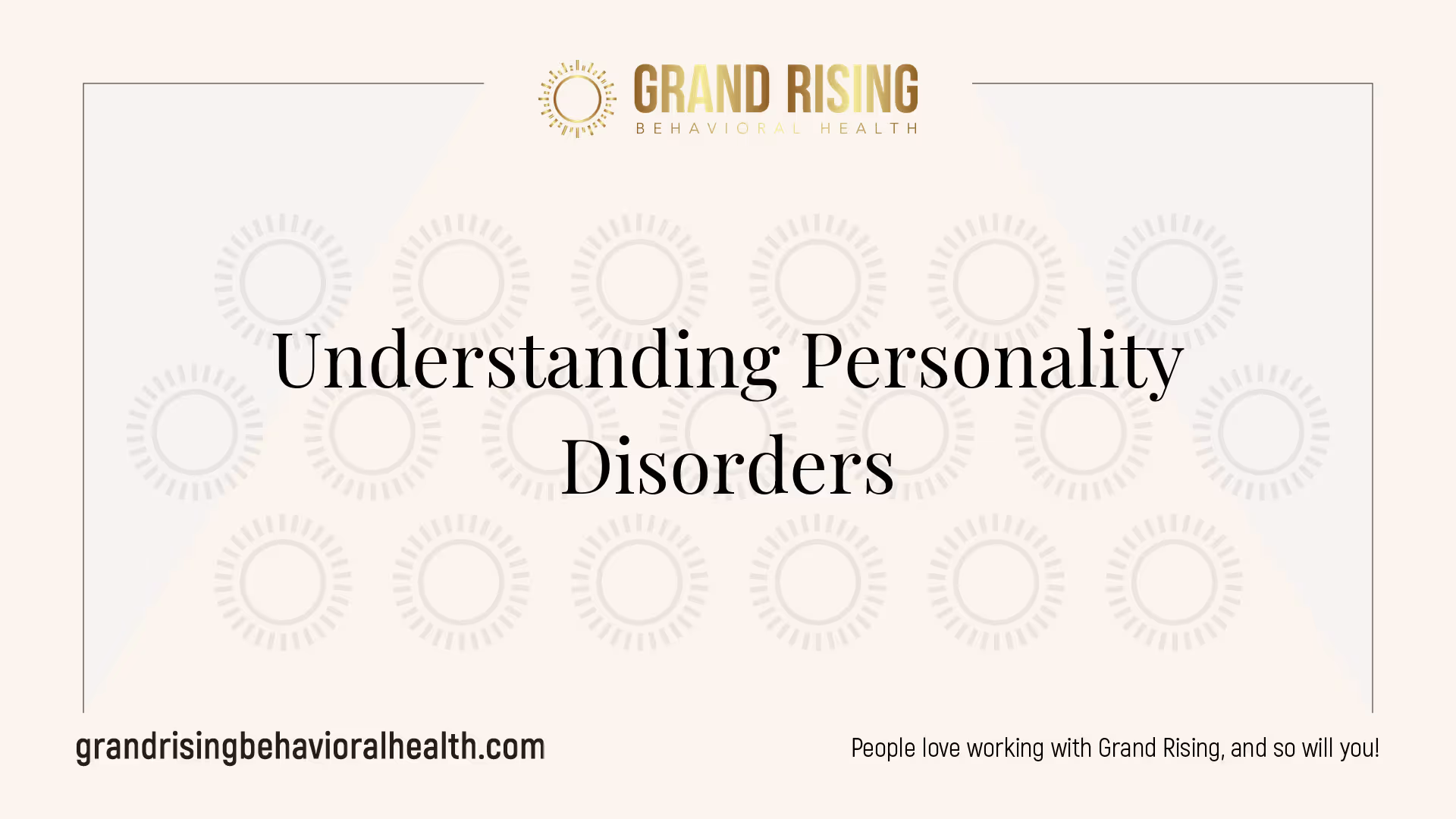Insight into Understanding Personality Disorders
Explore understanding personality disorders: an overview of symptoms, causes, and treatment options.


Understanding Personality Disorders
An overview of personality disorders illustrates their complexity and the significant impact they can have on individuals' interpersonal relationships and overall functioning. Various factors contribute to the formation and classification of these disorders.
Impact of Personality Formation
Personality begins to form early in life and is shaped through a blend of genetic and environmental influences. Psychological perspectives suggest that personality disorders arise from a consistent pattern of problematic self-perception and interactions with others [1]. These disorders can lead to lasting complications in various life areas, including social relationships and career pathways.
To understand the depth of personality disorders, it is essential to recognize that they often include behaviors or characteristics that clash with cultural expectations. This dissonance can create misunderstandings and conflicts with family and friends, leading to feelings of isolation.
Clusters of Personality Disorders
Personality disorders are categorized into three primary clusters, each containing distinct disorders characterized by specific symptoms and behaviors. This classification aids in diagnosis and treatment.
ClusterDescriptionExamples of DisordersGroup ASuspiciousness or lack of interest in others- Paranoid Personality Disorder (paranoid personality disorder)
- Schizoid Personality Disorder (schizoid personality disorder)
- Schizotypal Personality DisorderGroup BDramatic, overly emotional thinking, and unpredictable behavior- Antisocial Personality Disorder (antisocial personality disorder)
- Borderline Personality Disorder (borderline personality disorder)
- Histrionic Personality Disorder (histrionic personality disorder)
- Narcissistic Personality Disorder (narcissistic personality disorder)Group CAnxious thinking or behavior- Avoidant Personality Disorder (avoidant personality disorder)
- Dependent Personality Disorder (dependent personality disorder)
- Obsessive-Compulsive Personality Disorder (obsessive-compulsive personality disorder)
This cluster system helps mental health professionals understand and treat various personality disorders effectively. Recognizing the diversity in these disorders is crucial for proper intervention and support.

Symptoms and Manifestation
Understanding the symptoms and manifestations of personality disorders is crucial for early identification and intervention. This section discusses two primary challenges individuals may face: emotional understanding difficulties and issues with impulsivity and relationships.
Emotional Understanding Challenges
Individuals with personality disorders often struggle to understand and manage their own emotions, presenting difficulties in recognizing the feelings of others as well. According to the Mayo Clinic, these challenges can significantly affect their capacity to relate to others, resulting in adverse effects on family life, social interactions, work, and school performance.
Emotional Understanding ChallengesDescriptionDifficulty recognizing emotionsStruggling to identify and understand their own feelings or those of others.Low tolerance for distressInability to cope with emotional discomfort, leading to heightened reactions.Impaired empathyChallenges in understanding or sympathizing with the emotional states of others.
This lack of emotional insight may lead individuals to perceive their thoughts and behaviors as normal, complicating the process of seeking help. Often, they only pursue assistance when prompted by family or friends, especially when their struggles begin affecting relationships or other areas of life [3].
Impulsivity and Relationship Issues
Impulsivity is another hallmark symptom of personality disorders, further complicating interpersonal relationships. Individuals may act without considering the consequences, which can lead to unstable relationships and social problems. The behaviors associated with impulsivity can often conflict with societal norms, leading to misunderstandings and alienation from others.
Impulsivity and Relationship IssuesDescriptionReckless behaviorEngaging in risky or hazardous activities without thinking them through.Difficulty maintaining relationshipsStruggling to form and sustain healthy and stable connections with others.Misinterpretation of social cuesFinding it hard to perceive or respond appropriately to social signals.
The impact of impulsivity can extend to various life domains, including family dynamics and professional environments. Close friends and family members may find it challenging to relate to those experiencing these issues, potentially leading to withdrawal and isolation by the individual [4].
Recognizing these symptoms is critical in understanding personality disorders: an overview, providing insights into the complexities that individuals may face daily. Addressing these challenges early on can potentially mitigate their adverse effects and improve overall quality of life and relationships.
Causes and Risk Factors
Understanding the factors that contribute to the development of personality disorders can provide valuable insight into their nature. Various influences, both genetic and environmental, play a significant role in shaping personality.
Genetic and Environmental Influence
Personality forms early in life, molded by a combination of genetics and environmental factors. Both elements are believed to interact in complex ways that contribute to the development of personality disorders. While the exact causes remain largely unknown, research indicates that genetics can predispose individuals to certain traits and behaviors that may manifest as personality disorders later in life. Childhood experiences, such as abuse or trauma, also significantly influence personality development [1].
A summary of potential risk factors includes:
Factor TypeExamplesGeneticFamily history of personality disordersEnvironmentalChildhood trauma, neglect, or abusePsychologicalEmotional instability or difficulty in social settings
Onset and Development
The onset of personality disorders typically occurs during the teenage years or early adulthood. Although the precise trigger may vary, factors such as genetic predisposition alongside early developmental experiences often contribute to the likelihood of developing a disorder. Some common pathways include:
Research continues to explore how these elements connect and influence personality disorders. Understanding these causes helps in diagnosing and providing appropriate treatment options for conditions like borderline personality disorder: navigating emotional instability and others.
Consequences of Untreated Disorders
Untreated personality disorders can have profound effects on individuals' lives and relationships. From impacting personal connections to hindering daily functioning, the ramifications can be severe and far-reaching.
Effects on Relationships
Individuals with personality disorders often face challenges in their personal relationships. Difficulties in understanding emotions, tolerating distress, and acting impulsively can lead to conflicts that strain family ties, friendships, and romantic partnerships. Those close to individuals with these disorders may find it hard to comprehend their actions or thoughts, which can result in misunderstandings and feelings of isolation. According to The Recovery Village, individuals may tend to withdraw from their loved ones, further complicating interpersonal dynamics.
The following table summarizes the potential effects of untreated personality disorders on relationships:
Type of ImpactDescriptionMiscommunicationFrequent misunderstandings due to emotional dysregulation.IsolationIndividuals may withdraw from social interactions.ConflictsIncreased likelihood of arguments and tension with loved ones.Lack of SupportFriends and family may struggle to provide appropriate emotional support.
Impact on Daily Functioning
The consequences of untreated personality disorders extend beyond relationships to everyday life. Individuals may struggle with various aspects of daily functioning, including work, school, and social activities. Their ability to engage in productive and fulfilling actions can decline, leading to poor academic performance, job instability, and dissatisfaction in social interactions.
Examples of daily functioning challenges include:
Daily Functioning ChallengeDescriptionWork PerformanceDifficulty in maintaining a job due to impulsivity or conflicts with coworkers.Academic StrugglesProblems with concentration and emotional regulation affecting school success.Social WithdrawalAvoidance of gatherings and events due to overwhelming anxiety or discomfort.Poor Self-CareNeglecting personal hygiene and health, impacting quality of life.
Without proper support and treatment, individuals with personality disorders may experience a cycle of worsening symptoms and social isolation, leading to poorer health outcomes and increased hospital visits, including the risk of traumatic accidents and early death by suicide [5]. Seeking help from mental health professionals can significantly improve coping mechanisms and overall well-being, enhancing the quality of life for both individuals and their families [6].
Diagnosis and Treatment Options
Mental Health Assessment
Diagnosing personality disorders entails a careful evaluation performed by mental health professionals who specialize in mental health assessments. This process typically involves gathering comprehensive information about the individual's symptoms, personal experiences, and family medical history. Additionally, mental health care providers will conduct a thorough medical examination to exclude other potential causes of the symptoms [3].
A standard assessment may include:
It is crucial for the assessor to create a safe and supportive environment that encourages openness and honesty during the evaluation. This atmosphere enhances the accuracy of the diagnosis and understanding of the individual's unique experience.
Psychotherapy and Management
After a diagnosis is made, treatment often involves psychotherapy, or talk therapy, as a primary method of managing personality disorders. Various therapeutic approaches are available, depending on the specific disorder and individual needs. Common types of psychotherapy include:
Type of TherapyDescriptionCognitive Behavioral Therapy (CBT)Focuses on changing negative thought patterns and behaviors.Dialectical Behavioral Therapy (DBT)Combines cognitive-behavioral techniques with mindfulness practices and is effective for disorders like borderline personality disorder. Learn more about DBT for borderline personality disorder.Mentalization-Based TreatmentEnhances the ability to understand one's own and others' emotions and mental states. Learn about mentalization-based treatment for personality disorders.Schema TherapyFocuses on modifying dysfunctional beliefs and patterns that have developed since childhood. Discover more about schema therapy for personality disorders.
In cases where symptoms are severe, particularly when the individual is unable to care for themselves or is at risk of harm, hospitalization may be necessary. This step ensures appropriate mental health care and stabilization [6]. After stabilization, the individual may transition to outpatient treatment, a day hospital program, or a residential program for continued support.
While medications are not specifically approved by the FDA for treating personality disorders, certain psychiatric medications may alleviate specific symptoms. These drugs can complement psychotherapy as part of a comprehensive treatment plan.
Successful treatment requires a tailored approach that considers the individual's unique situation and needs, ultimately helping them navigate the complexities of their personality disorder. For insights into specific disorders, readers can explore links to borderline personality disorder: navigating emotional instability, narcissistic personality disorder: beyond vanity, and others.
Addressing Specific Disorders
Dialectical Behavioral Therapy (DBT)
Dialectical Behavioral Therapy (DBT) is a specialized form of talk therapy that is effective in treating various personality disorders. It focuses on addressing dangerous behaviors, including suicidal tendencies and behaviors that may hinder treatment and overall quality of life. DBT typically includes weekly one-on-one sessions with a trained therapist and can last for about a year [6].
DBT emphasizes the development of skills in four key areas:
Skill TypeDescriptionMindfulnessBeing present and fully engaged in the moment.Distress ToleranceLearning to tolerate painful emotions.Emotion RegulationManaging and changing intense emotions that are causing problems.Interpersonal EffectivenessBuilding and maintaining healthy relationships.
This therapy offers individuals strategies to cope with their emotions and responses, ultimately improving their overall functioning and well-being. For more insights, especially regarding borderline personality disorder, visit our article on dialectical behavior therapy (DBT) for borderline personality disorder.
Medications and Hospitalization
While there are no medications specifically approved by the FDA for treating personality disorders, certain psychiatric medications can help alleviate associated symptoms. These medications may be prescribed alongside therapy to enhance the overall treatment plan.
In cases where symptoms are severe, hospitalization may be necessary. This is often recommended when an individual poses a risk to themselves or others or is unable to care for themselves adequately. Once stabilized, a mental health professional may recommend a continuum of care, which could include a day hospital program, residential treatment, or outpatient services to ensure recovery and management of the disorder effectively.
For more information on various personality disorders and their features, explore our articles on narcissistic personality disorder: beyond vanity, antisocial personality disorder: understanding the sociopath, and the cluster system of personality disorders explained.
References
[2]:
[3]:
[4]:
[5]:
[6]:
More Resources
A team ready to start your journey.
Get in touch — today.
We are a safe space – a haven for exceptional individuals to receive discreet, personalized, in-person treatment and care.
.png)









